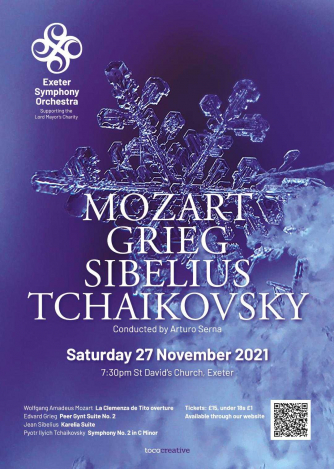Details
St David's Church
Queen's Terrace
Exeter
Devon
EX4 4HR
England
Programme
Wolfgang Amadeus Mozart – La Clemenza di Tito: Overture
Edvard Grieg – Peer Gynt suite no.2, Op.55
~ Interval ~
Jean Sibelius – Karelia Suite, Op.11
Pyotr Tchaikovsky – Symphony no.2, Op.17
Performers
Arturo Serna – Conductor
Exeter Symphony Orchestra
Programme Note
Our first indoor concert since late 2019 opens with the Overture to La Clemenza di Tito by Wolfgang Amadeus Mozart (1756-1791). Written in just 18 days, the opera was commissioned for the coronation of the King of Bohemia and premiered in Prague. Strangely, it did not go down well – Spanish-born Empress Maria Luisa especially disliked its “German” sound – and the piece is only infrequently heard in the concert hall. That said, its fresh themes have all the elegance and flair of Mozart’s best, and its sparkling, fanfare-like opening is suitably grand. As ever, Mozart had to work fast, but the first performance took place on time. Sadly, the pace of life became too much and he died three months later, aged just 35 years.
Of Scottish ancestry, the son and grandson of British diplomats, Edvard Grieg (1843–1907) became an influential leader of Scandinavian music. Although a composer of many short piano pieces and chamber works, his music for Henrik Ibsen's play is among his most well-known. He agreed reluctantly to write music for his friend’s play in 1874 and found it much more difficult than he had imagined, describing it as "…a terribly unmanageable subject." Nonetheless the Peer Gynt Suite No 2, Op 55 was published in 1893 with four, story-telling movements, including the familiar Solveig's Song.
Jean Sibelius (1865-1957) resented his country’s subservience to Russia and became passionate about the importance of the Karelia region, home of the oldest and most respected aspects of Finnish culture. Although part of the region lay in Russia, Sibelius accepted a commission to help fund education in the area around the medieval Karelian town of Vyborg (absorbed into the Soviet Union in 1944). He conducted the Karelian Music (later the Karelia Suite, Op 11) at its 1893 premiere in Helsinki and recalled that "You couldn’t hear a single note of the music – everyone was on their feet cheering and clapping". For those of a certain age, the Intermezzo, was the well-known theme tune for the ITV news programme This Week.
Pyotr Ilyich Tchaikovsky composed his Symphony No 2 in C minor, Op 17, ‘Little Russian’ in 1872. One of his most joyful compositions, it features three Ukrainian folk songs which give rise to the nickname referring to the Ukraine or Little Russia. His second symphony is his shortest, but the use of folk tunes makes it distinctive. Tchaikovsky recalled playing the piece on the piano for Rimsky-Korsakov, who was much impressed: "When I was in Petersburg I played the finale one evening and the whole company almost tore me to pieces with rapture; Mrs Korsakova begged me in tears to let her arrange it for four hands".

 Your events at Classical Events
Your events at Classical Events

